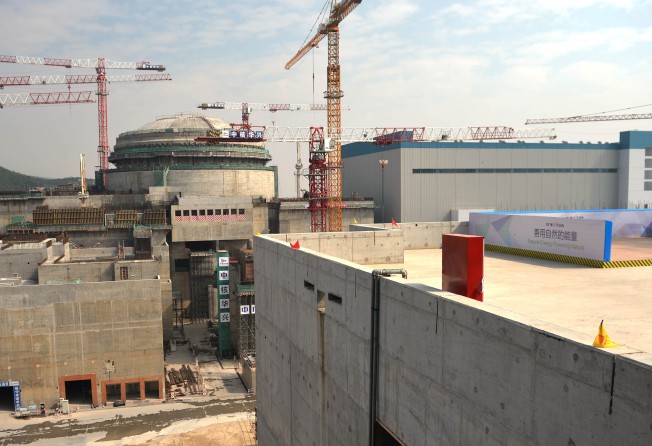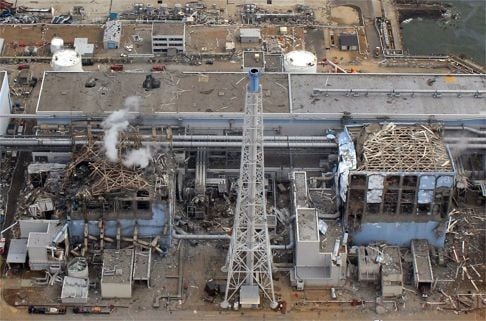China admits nuclear emergency response ‘inadequate’ as safety fears delay construction of two Guangdong reactors

China admitted on Wednesday its nuclear emergency response mechanism is “inadequate” for coping with “new situations and challenges” arising from its nuclear power plants.
The central government also said construction of two new-generation nuclear reactors in Guangdong province had been delayed because of safety concerns, but vowed that they would not be abandoned.
It said it also planned to build floating nuclear power stations – facilities that are like a huge buoy, with a nuclear reactor built inside, which can be moved from one area of sea to another.
as it seeks to triple its nuclear power generation capacity in five years.
In its first white paper on nuclear emergency response, published on Wednesday, Beijing said the existing disaster response programme was “inadequate” to cope with a “new situation and challenges”.
“Facing the new situation and new challenges of the nuclear sector, China’s nuclear emergency response [system] still has certain inadequacies in terms of technology, equipment, human resources, capacity and standards, the white paper said.
The paper has proposed a series of measures to boost nuclear safety and said China had learned lessons from previous disasters, especially the Fukushima nuclear disaster in Japan in March 2011, when a tsunami sparked the meltdown of three nuclear reactors and the release of radioactive materials into the air.
 An aerial view of Japan’s stricken Fukushima Dai-Ichi power plant reactor, including smoke rising from one reactor (left), following the meltdown of three of its reactors after a tsunami in March 2011. Photo: AFP
An aerial view of Japan’s stricken Fukushima Dai-Ichi power plant reactor, including smoke rising from one reactor (left), following the meltdown of three of its reactors after a tsunami in March 2011. Photo: AFP

Concerns over nuclear safety in Hong Kong and Macau have caught the particular attention of the central government. A section in the white paper was dedicated to the issue with promise to “answer public concerns in time” and “clear the doubts”.
Xu Dazhe, chairman of the China Atomic Energy Authority, told a press conference on Wednesday that the construction of the two European Pressurised Reactors in Taishan, in Guangdong, had been delayed owing to safety concerns.
We treat nuclear safety as top priority. If there is a problem, we must fully investigate it before continuing other works
French nuclear safety authorities reported last year that a possible manufacturing defect might lead to unexpected spreading of cracks on the reactor vessel which contained the nuclear chain reactions.
The Taishan plant had been delayed because “we treat nuclear safety as top priority,” Xu said. “If there is a problem, we must fully investigate it before continuing other works,” Xu said.
However, Xu ruled out the possibility that the Taishan plant would be abandoned.
China General Nuclear Power, which is building the plant, told the South China Morning Post that the possible vessel defect issue of the French-built reactors was a concern, but overall construction was still continuing at the expected pace.
One reactor had recently finished cold testing, which did not use nuclear fuel, and preparations for hot testing were proceeding on schedule, the company said.
However, if the French nuclear safety authorities’ investigation found the vessel defect issue to be serious, it could halt the whole project, said people in the mainland’s nuclear industry.
China’s nuclear power generation capacity would reach 58 gigawatts by 2020, which meant that the country would have nearly tripled its current capacity of 20GW in less than half a decade, the paper said.
Xu said the nation currently had 30 nuclear reactors in operation, with a capacity of 28.3GW and another 24 reactors with capacity of 26.7GW were under construction.
Authorities were planning to build a “marine floating power station”, which would go through “careful and scientific feasibility review”, he said.
“China is devoted to building itself into maritime power so we will definitely make full use of ocean resources,” he said.
The release of the paper coincided with the meeting on Wednesday of US Secretary of State John Kerry with top Chinese leaders to discuss North Korea’s nuclear programme, ahead of an expected trip by President Xi Jinping to the US for a nuclear security summit in March.
China will also speed up the drafting of a nuclear safety law and atomic energy law, and plans to establish a new national nuclear emergency rescue team of about 300 members. The nation’s armed forces will be involved.
Professor Li Qiang, a nuclear safety researcher at the Chinese Academy of Sciences’ Institute of Modern Physics, in Lanzhou, said he was glad that the government had realised the shortcomings in its nuclear disaster response system.
“Generally speaking, our hardware and software is 10 to 20 years behind some developed countries in the West,” he said.
“The construction of nuclear power plants and the build-up of disaster response system must be carried out simultaneously. Ignoring the later may lead to serious consequences,” Li added.
China has launched some of the world’s most ambitious projects on nuclear power. Government research institutes have been given tight deadlines to develop next-generation nuclear technology such as fast neutron, molten salt and accelerator driven reactors.
State-owned nuclear companies are also trying to sell their technology and reactors to other countries, including Britain, while considering controversial projects such as building a floating nuclear power plant in the South China Sea to provide remote islands in disputed waters.